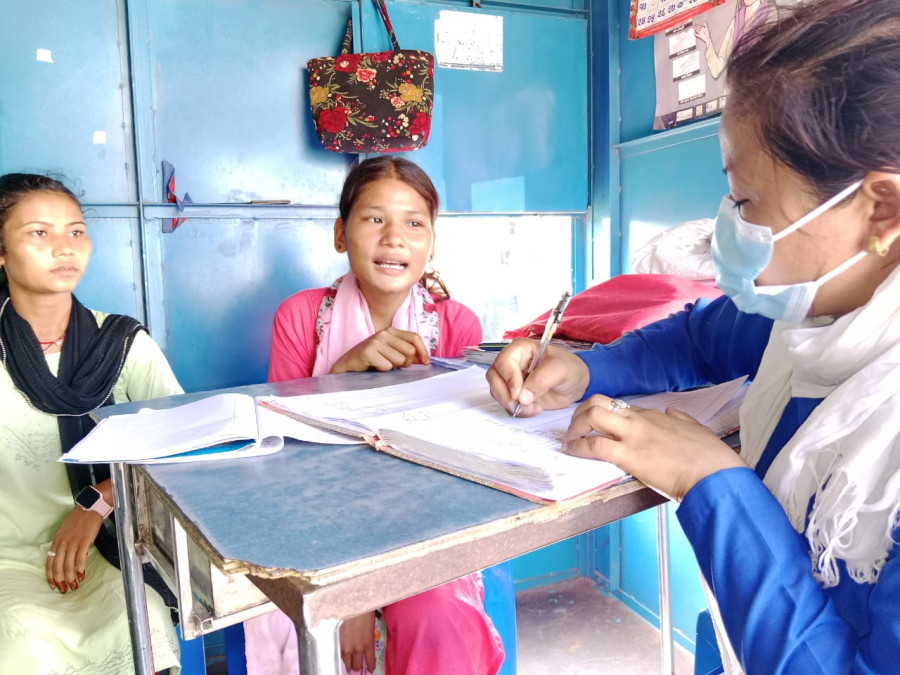Sudurpaschim Province
Sudurpaschim grapples with rising cases of missing persons
Among the missing, most are women and children from poor economic backgrounds. Efforts to curb the trend haven’t amounted to much.
DR Pant
Prabin Mahara still remembers the last thing his wife Ganga told him before she went missing some five years ago. “She told me to not leave our daughter alone until she gets back,” Prabin recalls. “But she never came back.”
Mahara, who is 29 and lives at Gauriganga Municipality’s ward 3 in Kailali, says his wife’s disappearance left him and their daughter, now eight years old, with several questions. Ganga was 26 years old when she went missing in early 2019. She left the house that day to bring back cattle left grazing in the nearby local stream.
The cattle returned home by themselves later in the evening. Prabin went looking for her around the village but nobody had seen her. “The next day I went to the police and social organisations to seek help to look for my wife,” he said. Prabin’s search did not bear any results.
Ganga’s mother, Dhansara Saud, believes something terrible must have happened to her daughter that day because Ganga was not the type to just leave like that. “She was very happy in her marriage,” said Dhansara. “I refuse to believe that she harmed herself or that she eloped with another man.”
Ganga is one among the hundreds, mostly women, who go missing from Sudurpaschim villagers yearly, mostly from Kailali and Kanchanpur districts. In Kailali, more than 2,000 people went missing in the last three years and among them, 1,239 were women. In the last fiscal year, 733 women and children went missing in Kailali, according to the District Police Office. Of them, 600 came into contact with police and other agencies, but there is still no information on the remaining 133, according to Kailali district police.
Superintendent of Police Devendra Pal of the Kailali District Police Office in Kailali said that around 80 percent of mispers are between the ages of 12 and 40. Data compiled by non-governmental organisations working in the border area to rescue missing women and children also matches the data of the police.
“The number of missing people getting murdered or willingly running away from home due to family disputes or extramarital affairs is very low,” said Pal.
Open border with India makes it difficult to find missing people, Pal added. “Those with mental disorders also go missing while some people get lost because they either fall into traps of people involved in human trafficking,” he said. “There are also cases where young girls get infatuated with someone through social media and run away from home to be with them only to be forced into prostitution in Nepal and India.”
According to Kanchanpur District Police, more than 1,000 complaints about missing persons have been filed in the last three years, and among them, 900 were about women. Among the mispers, the number of women and teenagers is very high, police said.
Shiva Charan Chaudhary, an official of Maiti Nepal office in Sudurpaschim, said most girls and women are lured by traffickers through social media. “There have been many cases of school-going girls getting infatuated with someone they met online,” Chaudhary said. “They then leave home and go missing after falling into the trap of traffickers.”
The number of missing people in Kanchanpur is increasing every year, said police. Several mispers have been found, but most of them were men who came into contact with police.
The reports registered with the police in the other seven districts of the province show that most of the missing people were women and children, although not as high as that of Kailali and Kanchanpur.
According to the data of the Dadeldhura District Police Office, in the last three years, 226 people disappeared, and except for two senior citizens, all were women and children.
“The reason why women and children go missing is different for different age groups, and nearly all of them happen to belong to families with poor economic conditions,” said Chaudhary.
“The number of missing people is also increasing among those who went to India for employment. People getting kidnapped by organ harvesting gangs is also a serious problem.”
Deputy Superintendent of Police Manohar Bhatta of the Dadeldhura district police office has been researching and studying the cases of missing people for a long time. According to Bhatta, mispers who remain in the country are most likely to be found, but it is very difficult to find those who enter India.
“Women and teenage girls ensnared by human traffickers mostly end up in prostitution in India. Some are trafficked to Gulf countries and have even been found murdered,” said Bhatta. “In cases of female mispers, the family and relatives don’t file a missing person’s report until it is too late, expecting their return.”
Apart from government agencies, more than half a dozen non-governmental organisations actively work in the search and rescue of missing people. Chaudhary said that efforts of both security agencies and continued awareness programmes haven’t amounted to much.




 10.12°C Kathmandu
10.12°C Kathmandu















